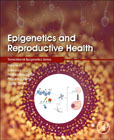
Epigenetics and Reproductive Health
Tollefsbol, Trygve
Balasinor, Nafisa H
Parte, Priyanka
Singh, Dipty
In sexually reproducing organisms, unique epigenetic mechanisms operate during gametogenesis and embryogenesis to ensure transfer of a healthy genome to the offspring. These epigenetic mechanisms may act through differential DNA methylation in the parental gametes, chromatin remodeling, and gene expression regulation by noncoding RNA. In recent times, evidence suggests that adverse environmental influences may alter these epigenetic mechanisms, influencing the health of parents, gametes and embryos, offspring, and even future generations. Recent developments in therapeutics are directed towards correcting these epigenetic mechanisms and cure or prevention of disease states. Epigenetics and Reproductive Health, a new volume in the Translational Epigenetics series, provides a thorough overview and discussion of epigenetics in reproduction and implications for reproductive medicine. Twenty international researchers discuss epigenetic mechanisms operating during the formation of male and female gametes, fertilization and subsequent embryo and placental development, particularly in mammals and transgenerational epigenetic inheritance. This volume also addresses aberrant epigenetic changes influencing male and female infertility, pregnancy related disorders, and those potentially linked to therapeutic manipulations and assisted reproductive technologies. Emphasis is placed on identifying biomarkers for early detection of aberrant epigenetic mechanisms, while later chapters examine the possibility of correcting these epigenetic dysfunctions, as well as current challenges and next steps in research, enabling new translational discoveries and efforts towards developing therapeutics. Thoroughly examines the influence of aberrant epigenetics during gametogenesis and embryogenesis, affecting parents, gametes and embryos, offspring, and future generationsExplores health outcomes for reproductive senescence, endocrine disruption, testicular cancer, prostrate cancer, breast cancer, ovarian, cancer, endometrial cancer, and cervical cancer among other disorders and developmental processes, as well as pathways for new drug discoveryFeatures chapter contributions from international researchers in the field INDICE: Section I: Spermatogenesis, Oogenesis and fertility 1. Epigenetic reprograming and maintenance in the male and female germline 2. Genomic Imprinting 3. Chromatin remodelling of the male genome during spermiogenesis and embryo development 4. Stem cells and epigenetics 5. Aberrant epigenetics and reproductive disorders (PCOS, Endometriosis, male infertility etc) Section II: Pregnancy/developmental/placental epigenetics 6. Epigenetic reprogramming of the embryo 7. Epigenetic modulation during placentation 8. Epigenetic modulation during pregnancy and pregnancy related disorders 9. Fetal origin of adult onset diseases Section III: Epigenetic - Lifestyle, Aging and Environmental Influence 10. Environmental chemicals and Endocrine disruptors 11. Nutrition 12. Stress and Lifestyle 13. Aging of male and female gametes/Reproductive senescence Section IV: Reproductive cancer and epigenetics 14. Testicular and Prostrate cancers 15. Breast cancers 16. Ovarian and Endometrial cancers 17. Cervical cancers Section V: Epigenetics in diagnosis, prognosis and therapy 18. Natural products / synthetic molecule as an epigenetic modifier 19. Epigenetic markers in prognosis/ early diagnosis 20. Therapies targeting the epigenome
- ISBN: 978-0-12-819753-0
- Editorial: Academic Press
- Encuadernacion: Rústica
- Páginas: 432
- Fecha Publicación: 01/08/2020
- Nº Volúmenes: 1
- Idioma: Inglés
